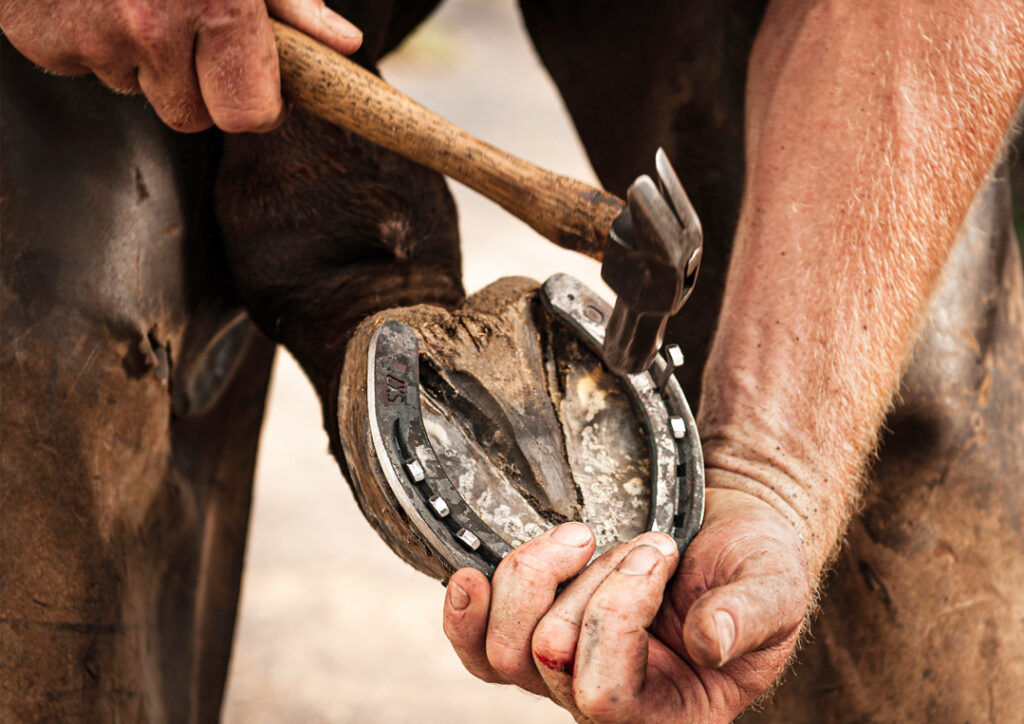He knew many, was known by few, known deeply by none. None knew his home place, for he had none, save his truck, adapted by him for his craft as an itinerant shoer of horses. Where he was depended on the calendar: spring and summer on the small-town rodeo circuit in the west, early fall through March on the pointing dog field trial circuits (all-age and shooting dog).
The year was 1977; the Vietnam War was finally over. He had served in that war, and it had taken its toll on him, in ways he kept to himself, as he kept all his thoughts and feelings. He was not unfriendly, just unrevealing.
He took pride in his work, and he understood its subjects. His father, now dead, had been an equine vet, and as a child and adolescent he had been close with him, for his mother had died giving birth to him and his father had filled both parental roles. When not in school he had been at his father’s animal hospital or with him making barn calls. He had absorbed his father’s feeling toward horses and much of his knowledge of their needs, which began with healthy feet. Hence his attendance of farrier school after high school. Then four years as a Marine, including two tours in Vietnam.
He made just enough income to support himself and save a few dollars in an IRA, new in 1974, which he invested in the S&P index fund with Vanguard, introduced in August 1976.
January found him in Southwest Georgia and February in West Tennessee, shoeing dog horses. One of his regular customers on the all-age circuit passed on to him a request that he come to Mossy Swamp Plantation in Georgia and shoe its equine stock, consisting of dog horses (handling and guest), hunting wagon mules, and hunters (the owner and his wife and two daughters rode to the hounds). Twenty-five head in all.
To his surprise, the owner, Sam Scales, was waiting for him when he arrived at 6 AM on the appointed day, and watched him shoe every head. They talked occasionally, the conversations always started by Scales and not prying, though he sensed Scales knew the essential facts of his life, no doubt learned from dog handlers who worked their strings on Mossy Swamp and took wagon dog prospects north in summer for breaking. He learned Scales too was a Marine, having served in the Pacific in the Second World War and mustered out a Major.
He observed the plantation’s stock was well cared for and high quality. When his work was completed, he presented his bill to Scales. He had been surprised Scales had not asked for a price before engaging him. He was more surprised when Scales handed him a check for half again the amount on the bill, saying, “That’s not enough son. I know about what it costs you to travel and live.”
Then Scales thanked him and asked, “Son, have you got health insurance?”
“No, Sir, I do not.”
Then Scales said, “Son, I am offering you the job of wrangler and farrier for Mossy Swamp Plantation. It comes with a house to live in, a truck, and a salary we will negotiate and health insurance. In addition to your salary, I will pay you by the hoof for your farrier work, and you can for your own account, if you choose, shoe for neighboring plantations, except my neighbor to the east who does not properly care for his stock. You have reached the age when you need to be off the road and where you can be scouting for a proper wife, and there a plenty of prospects in this country.”
The farrier was speechless. In a few minutes he said, “Can I let you know by Monday?” (It was Wednesday).
On Sunday he accepted Scales’ offer, including the amount Scales offered as salary. A year later, he and Scales’ older daughter Mary were married in the Big House of Mossy Swamp Plantation.
Author’s note: for Kim and Ann, my favorite horse lovers. Written on Veterans Day.

Short and sweet. I love it!